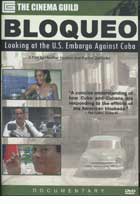
Bloqueo: Looking at the U.S. Embargo Against Cuba 2005
Distributed by Cinema Guild, 115 West 30th Street, Suite 800, New York, NY 10001; 212-685-6242
Produced by Cinematic Sisters
Directed by Heather Haddon and Rachel Dannefer
DVD, color, 45 min.
College - Adult
Latin American Studies, International Relations
Date Entered: 04/23/2007
Reviewed by Brian Falato, University of South Florida Tampa Campus LibraryThe 1959 Cuban Revolution that brought Fidel Castro to power not only created a change in Cuba’s government, but also a profound change in the country’s relationship with the United States. Before the revolution, about 85% of Cuban trade was with the U.S. Then in 1961, a law was passed that made it illegal for any U.S. firm to sell anything to Cuba and also restricted exports of Cuban sugar (a trade staple) and the importation of oil into Cuba. This embargo had an even greater impact after the Soviet Union, which had become Cuba’s leading trade partner after the blockade, collapsed in the early 90s. Cuba entered into a so-called “special period” of economic hardship and deprivation. Bloqueo (Spanish for blockade) looks at how Cuba is coping in the 21st century and how some Americans are trying to aid Cuba by defying the embargo.
The video opens with an explanation of how the organization Pastors for Peace brings yearly “caravans” containing food and other goods to Cuba, in direct violation of the embargo. The group gathers in San Antonio, Texas, and then rides a bus to Tampico, Mexico. From there, it flies to Havana, thus avoiding the U.S. ban on air travel to Cuba. Since 1992, Pastors for Peace has provided Cuba with 2300 tons of goods during its annual caravans. The U.S. government has not prosecuted anybody involved in the embargo violations thus far.
The need for the goods is certainly there. The U.S. further tightened its embargo in 1992 by passing the Torricelli Act, which made it illegal for even a foreign subsidiary of a U.S.-owned company to trade with Cuba. And the video says that even companies not under American control are pressured by the U.S. government to not trade with Cuba, or risk losing business in the American market. There are shortages of food and medical supplies, and a drastic decline in imports of oil, which used to come mostly from the Soviet Union, means frequent blackouts.
Cubans have had to use ingenuity to cope with these problems. As the video Sin Embargo also demonstrated, Cubans to an extent are following the adage “If life gives you lemons, make lemonade.” Bloqueo explains how organic farming is growing in Cuba, since lack of petrochemicals means little synthetic pesticides are available. About half the vegetables used in Havana are organically grown there.
A lack of oil also means increased use of alternative energy sources. The Pastors for Peace caravan brought photovoltaic panels to use in solar energy, and 30% of the energy generated during the sugar harvesting season comes from sugar cane waste used as biomass.
The video provides interesting information, but it is obviously one-sided. No U.S. government spokesmen or Cuban refugees are heard to try to defend the blockade or speak out against human rights abuses in Cuba. The Cubans, Americans and others who are interviewed speak only positively about life in Cuba, even with the challenges. The adaptations Cuba has made to cope with the embargo show “a different way of running society,” says a British activist, and adds this example of sustainable economy scares business interests in other countries, who fear the Cuban example could spread. He also says wealthy Cubans fled to the U.S. because they saw their interests would not be served under Castro and have been itching to return to their positions of power in Cuba ever since.
One can oppose the embargo against Cuba without being a Castro supporter. Unfortunately, this point is lost in watching the video, since all those who speak seem to be pro-Castro or at least willing to overlook his faults. This makes the message against the embargo easy to dismiss by many, and weakens the video’s argument. Thus, although Bloqueo is recommended, it is with reservations, and its presence in libraries serving large populations of Cuban refugees would be almost certainly challenged.